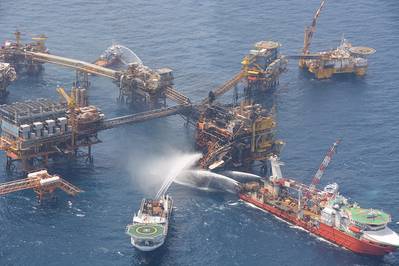In one movie, two bikini-clad women sashay around a swimming pool in stiletto heels, laughing about how one used sex to persuade her hard-working husband to buy her an expensive truck.
In another, two oil executives entangled in a love triangle are transported 20 years into a bleak future by flashing green rocks.
Yet another follows a devilish seductress in fishnet stockings as she exhales magical black smoke and wreaks havoc on an oil rig.
The scenarios sound like typical telenovela fare. Like many of those popular Mexican soap operas, they traffick in sex, the supernatural and not-so-special effects. They even share some of the same actors.
But these movies have a serious purpose: promoting safety among the tens of thousands of workers at Pemex, Mexico's giant state-owned oil company.
Since 2009, Pemex has paid a private company, Oaxaca-based Cinetransformer, $44 million to produce at least 18 movies, all less than an hour long, and show them to workers in the company's mobile theaters. These tractor-trailers travel from worksite to worksite, where they are converted into 90-seat venues with bathrooms, air-conditioning and popcorn machines.
The aim, according to Pemex, is to foster an overall culture of safety to complement the company's hands-on safety training. That's important. Oil exploration and production is one of the most dangerous industries in the world. And Pemex has one of the highest injury and fatality rates among oil companies, according to the International Association of Oil and Gas Producers (IOGP).
The problem for some current and former Pemex employees, among other people, is the company's approach with its movies - what Eduardo Zavala, Pemex's subdirector of industrial safety and environmental protection, calls "edu-tainment."
Raul Munoz, general director of Pemex from 2000 to 2004, watched "A Story of Oil Workers," the first of Cinetransformer's Pemex movies. In it, the worker who bought his wife the expensive truck is too busy dealing with loan sharks to avoid being engulfed in flames on an oil platform. (Spoiler alert: He survives.)
"It's very difficult to see what the point of this was and much less that it could be effective," Munoz said. "It's awful. It's shocking. It's a mockery."
The movie program is "an excessive cost and it cuts spending from where it's really needed," said Carlos Arjona, a 28-year Pemex veteran. He delivered supplies and equipment during the emergency response to an April fire that killed seven Pemex workers and injured as many as 45 on a rig in the Campeche Sound.
Pemex said that the Cinetransformer movies augment a rigorous hands-on safety training program, and that last year, it provided safety instruction to 36,000 production and exploration workers at four sites around Mexico. The company said it spends more on this sort of training than on the Cinetransformer movies. It declined to provide numbers.
A Cinetransformer spokesman, in an email, said the company's productions for Pemex weren't soap operas, but "motivational, with elements of drama, suspense, action, romance and comedy." "NO POSITIVE IMPACT" On June 25, the national daily El Universal newspaper ran an article about the movies and the money Pemex has spent on them. The sums involved prompted lawmakers across the political spectrum to call for a review of the cost of the movies, without questioning their effectiveness.
Earlier this year, however, the Federal Audit Office, a congressional investigative agency, released an audit that found that Pemex's Safety, Health and Environmental Protection program (SSPA), which includes the Cinetransformer films, "had no positive impact on safety indicators."
The Federal Audit Office can only review contracts and then make recommendations to internal Pemex investigators. And as Reuters documented in a January report, Pemex investigators almost always disregard audit recommendations to discipline employees, pursue criminal charges or claw back money from contractors.
Pemex's fatality and injury rate for production and exploration workers was six times the international average in 2013, the latest data available, according to the IOGP. (IOGP publishes data by country; Pemex and its domestic and foreign contractors account for more than 99 percent of all exploration and production work in Mexico.)
Pemex said the IOGP numbers are correct. But the company also calculates a lower injury and fatality rate based on its own data. In May, after Reuters made inquiries into the oil company's safety record and the Cinetransformer contracts, Pemex issued a press release citing those in-house numbers as proof that its accident and fatality rate fell to historic lows last year.
That Cinetransformer's movies aren't typical safety training material is clear to anyone who sees them. Reuters watched 10 of the 18.
In "Investigation and Analysis of Incidents and Accidents" - the titles lack the panache of the plots - a Pemex worker who sustains a spinal injury on the job walks again after his son prays to the Virgin Mary.
Smoke-spewing succubus Lucia Fernanda (Luci-Fer) distracts oil-rig workers by flashing her lacy lingerie at them in "Operational Discipline II" - a sequel. She is ultimately defeated by a father-son team that employs strict Pemex safety protocols (though not before the son, like his father in the first movie, is seduced by the villainess).
A Pemex employee in "Health at Work" shuns ear protection, goes deaf, and is unable to hear his daughter canoodling with her boyfriend just feet away.
The time-traveling executives in "Administration of Process Safety" learn that if Pemex does not focus on safety, the company will end up killing all the seafood in the ocean, and starving Mexicans will rise up against the company.
"A traditional safety video is not fun," said Zavala, the Pemex safety official. "Now there is applause, sometimes the workers even shed a tear. It touches their hearts." The movies harness the power of sex, too: "If a woman comes out in a bikini, it's like salt and pepper for the oil workers," Zavala said.
Betty Monroe, a telenovela star on TV Azteca, Mexico's No. 2 broadcaster, is a fan of the genre after playing a Pemex accident investigator in "Investigation and Analysis of Incidents and Accidents." "There has to be melodrama to explain that there will be consequences if someone is not doing their job well," she said. FAMILY AFFAIR The force behind these creations is Julio Fernandez, founder and president of Cinetransformer.
Fernandez's father, Raul Fernandez, and his uncle, Rolando Fernandez, gained fame in the 1980s when they produced and directed the "Lola la Trailera" ("Lola the Trucker") movies, a series about a beautiful long-haul trucker who fights drug dealers, corrupt government officials and the legendary beasts called chupacabras. The movies, starring Rolando's wife (and Julio's aunt), Rosa Gloria Chagoyan, have become cult classics.
The Fernandez family also owns Traylfer, a company that builds trucks, including the Cinetransformer mobile movie theaters that Julio's father, Raul, designed in 1995.
Julio Fernandez for years had been hoping to sign up Pemex as a client to use the mobile theaters for its training movies. Nearly a decade ago, he got his chance when, through friends, he was able to set up a meeting with Rogelio Morando, then head of Pemex's safety program.
At the time, a Mexican university was producing the company's safety movies under a contract worth about $840,000. After the meeting, Cinetransformer got the job of showing the university's movies in its mobile theaters.
Fernandez had bigger plans. He thought the university's movies were dry and boring. To draw Pemex workers - viewing is optional - he proposed making sexier movies, with telenovela stars and higher production values.
"That's how we got interested in it," Morando said. "They understood how to bring the messages to the workers in their language."
On July 29, 2009, Morando awarded Cinetransformer a $564,892 test contract. Like the two that would follow, it was a no-bid process. Pemex justified to regulators the absence of competitive bidding on the grounds that it had already worked with Cinetransformer and knew that it was best for the job.
Less than two months later, Pemex employees in Poza Rica and Villahermosa were watching "A Story of Oil Workers."
The movie opens in a hospital waiting room. An elderly man, played by veteran Mexican actor Salvador Sanchez, assures his grandson that the operation he is going to have "doesn't cost me anything because Pemex pays for everything even though I am retired."
Meanwhile, over breakfast, the boy's mother tells her husband, Rodrigo, a Pemex oil worker, that she worries about him when he is out on the rig. He reminds her that Pemex gives them a nice house, good benefits and access to the Pemex sporting complex, including a pool.
The bare-chested husband finishes his breakfast, sweeps his wife off her feet and carries her into the bedroom. Their tryst is interrupted a short while later by the grandfather and the boy, returning from the hospital earlier than expected.
There is no mention of safety until a third of the way into the film, as the hero Rodrigo leaves his wife's embrace and joins up with Gerardo, the co-worker in trouble with loan sharks after buying his wife a truck. SMASH SUCCESS Pemex executives were thrilled with the results. "It was a very successful program and at a much lower cost than doing higher intensity training," Morando said.
On Aug. 13, 2010, Cinetransformer got its second Pemex contract, this one for $17.5 million. It provided for the company to hire nine pre-production staff and a production crew of 53 people, including 10 stunt doubles, four drivers and two aerial cameramen, plus actors and extras.
Monroe, the TV Azteca actor, spent several days learning about oil production and then about two weeks filming at a Pemex facility in the state of Tabasco. "They told me they wished they had a co-worker as good- looking as me," she said. Her pay, she said, was comparable to what she earned for other movies she has worked on.
Alejandro Camacho, a telenovela star on Televisa, the world's largest Spanish language television producer, starred as a Pemex engineer in "Your Health Is Not a Game." He said he got involved through his friendship with the Fernandez family and Chagoyan of "Lola" fame.
"The Fernandez's company supports the livelihoods of a lot of people," Camacho said. Like Monroe and other actors, he declined to say how much he was paid, but he had no complaints.
On Sept. 18, 2012, three weeks after screening one Cinetransformer film outside of Reynosa, a gas explosion killed 30 employees at a Pemex gas facility near the city. Pemex said it wouldn't release the results of its investigation into the accident until 2025, according to a report in the newspaper Hora Cero at the time.
By the end of 2012, Pemex's injury and fatality rate for production and exploration workers was about 12 times the international average.
On Feb. 1, 2013, Pemex awarded Cinetransformer its next contract, worth $26.4 million.
The day before, an explosion ripped through Pemex's headquarters, killing at least 37 employees and injuring more than 100 others. The attorney general's office said the explosion was caused by a spark from a faulty electrical outlet that ignited an accumulation of toxic solvents and methane gas in the building's basement.
Morando retired from Pemex in 2013. He now owns a boutique hotel and restaurant in Coatepec, in the state of Veracruz.
The current subdirector of Pemex's SSPA safety program, Luis Betancourt, said the Cinetransformer movies have been worth the $44 million investment and "have surely made some contribution" to improving safety.
To date, Cinetransformer's Pemex movies have filled 850,000 theater seats with Pemex workers and their relatives.
(By Elinor Comlay, M.B. Pell and Mica Rosenberg; Additional reporting by Joanna Zuckerman Bernstein and Gabriel Stargardter. Edited by John Blanton)











